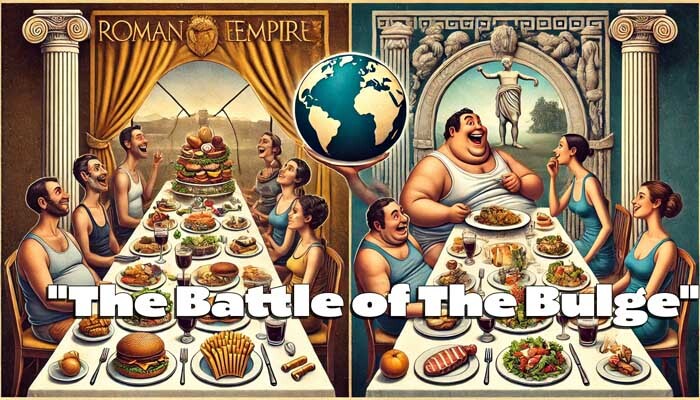Posted by - News Staff \
\
December 30, 2024
\
Filed in - Arts & Culture
\
Obesity
overeating
\
4.7K views \
0 comments \
0 likes \
0 reviews
For as long as humans have had access to abundance, we’ve struggled with a peculiar paradox: some people eat themselves into ill health while others go hungry. It’s a baffling spectacle, and perhaps nothing captures the irony more than the world we live in today—a place where $1,000-a-month injections are touted as a solution to overeating while heart-wrenching images of starving children are just a channel click away. Truly, we are a species of extremes.
The United States, for instance, spends approximately $72 billion annually on weight loss products, including diet plans, miracle pills, and exercise equipment. Meanwhile, the World Health Organization estimates that 9% of the global population—around 735 million people—suffer from hunger. Somewhere between that Peloton commercial and clips of malnourished children lies a profound disconnect. It’s not just our waistlines that are bloated; our contradictions are too.
Our overeating habit, however, isn’t entirely new. Even in ancient Rome, emperors and their courts indulged in lavish feasts, punctuated by trips to vomitoriums so they could eat more. Fast-forward to today, and we’ve traded togas for athleisure wear while maintaining the overindulgence. The difference? Now, it’s super-sized, sugar-laden, and mass-produced. The average American consumes around 3,600 calories a day—about double what most people need to survive—while spending billions on remedies to undo their indulgence.
Of course, there’s an entire industry built on this cyclical madness. Big Pharma profits immensely, raking in billions from drugs to treat diabetes, hypertension, and heart disease—all conditions closely tied to obesity. And yes, doctors often benefit, too, as visits for obesity-related illnesses flood their schedules. Add in the diet industry and gym memberships (worth a combined $94 billion globally), and you realize that being overweight isn’t just a personal problem; it’s an economic ecosystem.
Yet, here’s where it gets even weirder: obesity isn’t confined to wealthy nations. In so-called third-world countries, where hunger persists, obesity is rising among wealthier urban dwellers. It seems the globalized food industry has succeeded in delivering high-calorie, low-nutrient junk to every corner of the globe. One might argue that if Mother Nature designed us to be lean, she clearly didn’t anticipate drive-thrus or deep-fried Twinkies.
The result? The paradoxical coexistence of starvation and overconsumption has created a global health crisis. Obesity is now linked to 2.8 million deaths per year, according to the World Health Organization. Meanwhile, malnutrition continues to claim the lives of over 3 million children annually. Together, these grim statistics suggest that our problems aren’t about food scarcity but its distribution and misuse.
As for the question of whether God or Mother Nature made a mistake? Perhaps it’s not them but us who have erred. We’ve taken the gift of abundance and turned it into an affliction, one that feeds industries while leaving us collectively unsatisfied. Maybe the solution isn’t more injections or crash diets but rediscovering the simple wisdom of balance—a concept even the Romans might have applauded, between courses, of course.

![]() \
\ ![]() 0
0
963
1
0
0
963
1